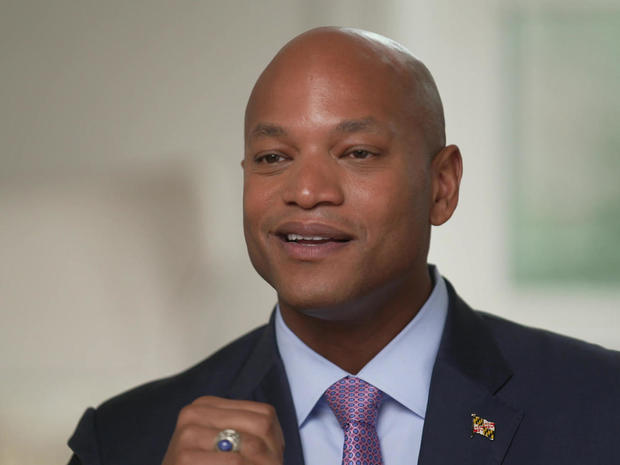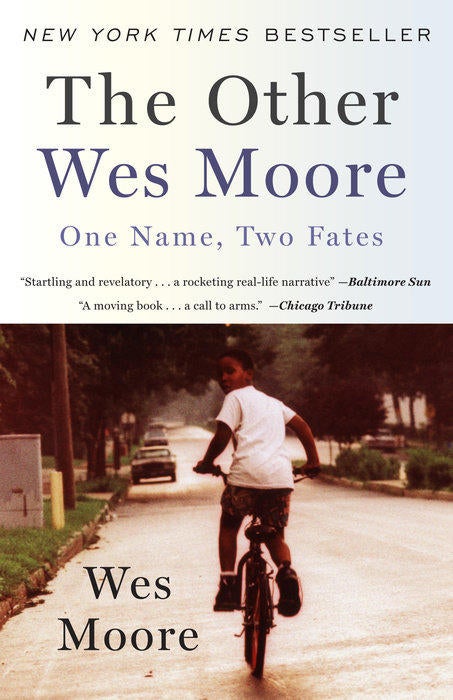▶ Watch Video: Maryland Gov.-elect Wes Moore on the power of second chances
“Politics is a very humbling business,” said Wes Moore. “When we were first got into this race, I was polling at 1%!” Moore is a bestselling author, former Army captain, and now, as a first-time’s-the-charm politician, Maryland’s Democratic governor-elect. He won in a landslide, beating his Republican opponent with more than twice as many votes. “We ended up receiving 89% of the vote in Baltimore,” he said.
A vote of confidence from a city that’s struggling with high crime rates, high poverty rates, and high unemployment rates.
Sanneh asked, “A lot of smart people have been working on these issues for a long time. What makes you think you can do something that all these smart, talented people haven’t been able to do?”
“I think we have to approach this that it’s not about what program can we institute, right? It’s about how are we changing the entire human condition that people are existing in.”
“Changing the entire human condition? That’s a tall order for a governor!”

“It’s a very tall order, but it’s doable,” Moore said. “We’ve gotta change the entire ecosystem. It’s the air people breathe, it’s the water that they drink, it’s the homes that they are living in, it’s the transportation access they have (or don’t have), it’s the way they are policed. And that’s something that a governor can actually fix.”
For instance: in Maryland (as in most other states), even if someone doesn’t personally kill anyone, if they’re involved in a felony that leads to a murder, they can be charged with so-called “felony murder.” Moore told CBS News he supports a bill that would prohibit that charge for juveniles. “When you’re looking at the juvenile justice system, we can’t forget these are children that we’re talking about,” he said.
“So, are you open to signing that bill?”
“Yeah. I’m absolutely open to looking at how can we come up with ways of being able to make sure that our society is accountable, yet at the same time, never forgetting we’re still talking about children in all of this.”
Sanneh said, “You sound like you could do this in your sleep – if I busted into your bedroom at 3:00 in the morning, you could give a stump speech!”
“I love this work! I’d never run for public office before, but I’ve been a public servant for my entire life.”
Dawn Flythe Moore and Wes have been married for 15 years. She said her husband wasn’t so much “stubborn” as “hard-charging” and “mission-driven.”
Since 2016, they have lived in Baltimore. This week, the family is moving to the governor’s mansion in Maryland’s capital. Moore will be sworn in on Wednesday.
Sanneh asked, “You’ve got two kids who grew up here in Baltimore. How did you sell them on Annapolis?”
Wes replied, “A puppy.”
Bishop Donte Hickman, who leads Southern Baptist Church in East Baltimore, where Moore is a member, said the congregation is very excited that one of their own will be running the state government. Hickman told Sanneh that they had to push Moore to run: “We really felt like he had the moral compass and clarity, and that he could build consensus around the state.”
And Moore has a resume seemingly built for this moment. He’s a Johns Hopkins graduate, a Rhodes scholar, and a soldier who fought in Afghanistan. He worked as an investment banker, and ran Robin Hood, a non-profit organization. “There was never a time when I said, ‘This is gonna be great when I run for governor one day,'” Moore said. “But every single one of those experiences prepared me for this.”
Westley Watende Omari Moore, 44, was born in Takoma Park, Maryland, a suburb of Washington. His father died in 1982, when Moore was three. When he was five, his mother took Wes and his two sisters to live with her parents in the Bronx, in New York City. “Their house was barely big enough for them,” he said. “But when my mom called and said she needed help, they figured out a way to make it big enough for all of us.”
By 1989, Moore was acting out. “I am a kid who was 11 years old with handcuffs on my wrists.”
Sanneh said, “I think you might be the first governor who has ever previously been arrested for graffiti?”
“That’s probably right! And I think about how different that could’ve turned out, right? Because in my case, I’m sitting there in the back of a police car with my friend, and then eventually after, you know, a talk and a lecture, the officer pulls me out of the car, unlocks the cuffs, and lets me go.”

It’s a story he told in his bestselling 2011 memoir, “The Other Wes Moore.” But these days, it comes with a moral: “I want us to be a society that believes in second chances. I want the people who are receiving the second chances also to understand that, you know, at some point second chances become last chances. And I want people to understand their own individual power of being able to change the lives of people.”
Moore’s own transformation began when his family sent him to military school in Pennsylvania; he was 13. A year later, his mom moved back to a suburb outside of Baltimore, for a steady job with benefits at a non-profit. “That job didn’t just change her life; it changed the trajectory for our entire family,” he said. “And so, it was from that point that when people said, ‘Where are you from?’ my answer was easy: Baltimore.”
Many found that answer misleading. During the campaign, Moore was criticized for exaggerating his connection to Baltimore. But he hasn’t wavered. “I’m not a Baltimorean by birth, I’m a Baltimorean by choice. I believe in this place. I believe in this city. I believe in the people here.”
And now, as he gets ready for life as governor in Annapolis, he is confident that they believe in him.
At his church in East Baltimore, Sanneh asked Moore, “What did people in this congregation, what do they ask you to do there?”
“Don’t forget them,” he replied. “The thing that they oftentimes say most to me is, ‘Just don’t forget us.'”
For more info:
- “The Other Wes Moore: One Name, Two Fates” by Wes Moore (One World), in Trade Paperback, eBook and Audio formats, available via Amazon, Barnes & Noble and Indiebound
Story produced by Mary Raffalli. Editor: Lauren Barnello.
See also:
- From 2010: Wes Moore, and “The Other Wes Moore” (“Sunday Morning”)







